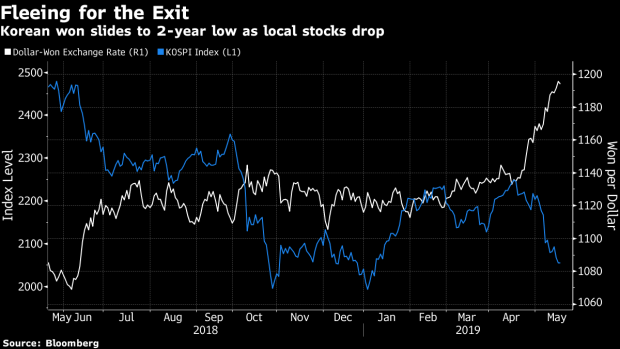May 26, 2019
Koreans Buying Foreign Stocks Hammer Asia's Worst Currency
, Bloomberg News

(Bloomberg) -- As if South Korea’s won doesn’t have enough to worry about, a stampede in local investors toward overseas assets is threatening further losses in Asia’s worst-performing currency.
Korean investors traded a net $37.9 billion of foreign stocks and bonds last quarter, a 51% increase over the previous three months, data from Korea Securities Depository showed. The won has tumbled more than 6% this year as economic growth has slowed, exports have been pummeled by the U.S.-China trade war and a souring semiconductor market has hurt companies such as Samsung Electronics Co.
“We are increasing our allocation in foreign assets through a hedge fund,” said Heo Pil-Seok, chief executive officer in Seoul at Midas International Asset Management, which oversees the equivalent of $6.8 billion. “The fundamentals of local assets are weakening, especially since economic growth contracted in the first quarter, and the prolongation of the trade war is fostering the fear that it will take a bigger toll on Korea.”
The surge in demand for overseas investments is being fueled by a prolonged slump in local shares. The benchmark Kospi stock index has dropped 17% in the past 12 months, and on Friday briefly erased all its gains for this year. In comparison, a gauge of global equities has risen 10% in 2019.
The National Pension Service, South Korea’s largest investor, has been at the vanguard of the move into overseas assets. The fund, which oversees the equivalent of about $560 billion, aims to increase investment in foreign stocks to about 30% of assets by the end of 2023, compared with 25% under its previous plan for 2022, the Ministry of Health and Welfare said last year.
The struggling economy is one of the major reasons behind the switch toward overseas assets.
Gross domestic product shrank the most in a decade in the first quarter as declining investment and weak technology demand took a toll on the economy. Exports have dropped for five straight months, while the current-account surplus slid to a seven-year low last quarter.
“Local investors seem to be leaving Korea because indicators are sluggish, and in terms of demand and supply that is a won-negative phenomenon,” said Lee Young Hwa, an economist at Kyobo Securities in Seoul. Still, the main driver of won weakness is the trade war and slowing global growth, she said.
The struggling economy is boosting speculation Bank of Korea will cut interest rates, another negative for the won. The time is approaching to start getting concerned about inflation being excessively low, Bank of Korea policy board member Cho Dongchul said May 8.
The authorities aren’t taking the won’s weakness lying down. South Korea warned traders last week that the currency’s recent decline is excessive and it will hold a meeting soon to discuss trading that has distorted the market, according to a finance ministry official who asked not to be named.
Meanwhile, the news keeps getting worse. Samsung Electronics, the world’s largest memory-chip maker and the biggest constituent of the Kospi index, has tumbled 6.9% this month as concern over the U.S.-China trade war added to a negative outlook for the global chip industry.
“Foreign investment isn’t particularly strong these days, but there has been more demand from local investors to switch part of their won assets to those denominated in other currencies,” said Heo at Midas International Asset.
--With assistance from Kyoungwha Kim and Myungshin Cho.
To contact the reporters on this story: Hooyeon Kim in Seoul at hkim592@bloomberg.net;Heejin Kim in Seoul at hkim579@bloomberg.net
To contact the editors responsible for this story: Tan Hwee Ann at hatan@bloomberg.net, Nicholas Reynolds
©2019 Bloomberg L.P.





